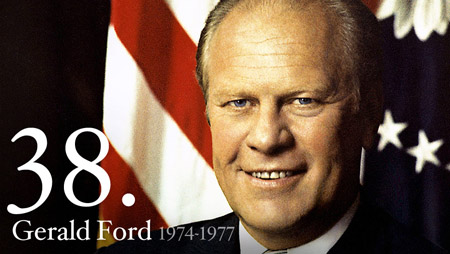
Representative Gerald Ford in 1970, during an unsuccessful attempt to impeach Supreme Court Justice William O. Douglas.
Gerald Ford became the 38th President after the resignation of Richard Nixon on August 9, 1974. Nixon resigned when faced with impeachment over Watergate. He was not impeached but the House voted 412-3 to accept a House Judiciary Committee recommendation of impeachment.
Since 1789, one principal question has persisted—how to define “high crimes and misdemeanors.” This question has been hotly debated by members of Congress, defense attorneys, and legal scholars from the first impeachment trial to the most recent. Were misdemeanors lesser crimes, or merely misconducts? Did a high crime or misdemeanor have to be a violation of written law? Over the years, “high crimes and misdemeanors” have been anything the prosecutors have wanted them to be. In an unsuccessful attempt to impeach Supreme Court Justice William O. Douglas in 1970, Representative Gerald Ford declared: “An impeachable offense is whatever a majority of the House of Representatives considers it to be at a given moment in history.” The phrase is the subject of continuing debate, pitting broad constructionists, who view impeachment as a political weapon, against narrow constructionists, who regard impeachment as being limited to indictable offenses.
Source: U.S. Senate “Briefing on Impeachment”